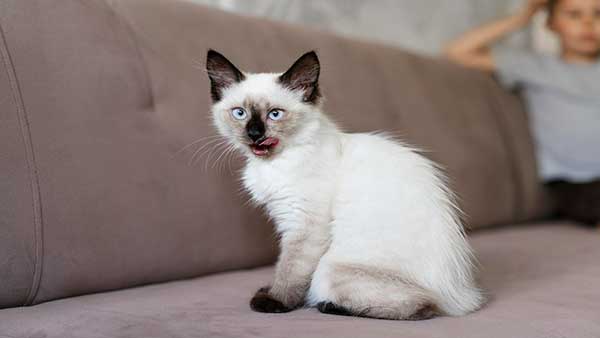Why your cat was crying last night? My nieghbour asked me this question. I told him the medical reasons for cat crying that my vet has discussed with me. This information is also important for you not matter you have a cat or not… Let’s explore five scientifically-backed medical reasons why your cat may be crying and how to address them effectively.
Cats communicate their needs and emotions through vocalizations. While some meows are harmless, frequent or excessive crying can point to serious health issues. Understanding the medical reasons behind your cat’s cries is essential for their well-being.
Check Pet-related resources on our most explore category Pet Health.
Pain: A Common Cause of Excessive Cat Crying
Pain is the most common cause of excessive crying in cats. Unlike dogs, cats often hide their discomfort until it becomes unbearable. When they cry out, it’s their way of signaling distress. Pain may result from injuries, dental problems, or chronic conditions like arthritis.
Dental diseases such as periodontal disease or tooth resorption are particularly painful and can lead to constant crying, especially during eating. Arthritis, which affects nearly 90% of older cats, also causes significant discomfort. Cats with this condition may cry when jumping, climbing stairs, or even moving around their favorite spots.
If your cat exhibits increased vocalization alongside reduced activity or hypersensitivity to touch, a veterinarian should examine them. Early diagnosis can help alleviate their pain through medications, dietary changes, or even physical therapy.
Cat Crying Due to Hunger or Nutritional Deficiencies
Cats are vocal when they’re hungry, but excessive crying may indicate a deeper issue, such as nutritional deficiencies. Proper nutrition is crucial for a cat’s health. A lack of essential nutrients like taurine can lead to serious conditions, including heart disease, retinal degeneration, and lethargy. These conditions often manifest in vocalizations as the cat becomes increasingly uncomfortable.
Hyperthyroidism is another condition closely linked to crying. This disorder, characterized by an overactive thyroid gland, causes cats to feel perpetually hungry, even after eating. Affected cats may lose weight rapidly despite an increased appetite and cry persistently near mealtime.
Owners should ensure their cats are eating a well-balanced diet and monitor any unusual changes in eating habits or weight. A veterinarian can perform blood tests to check for underlying conditions like hyperthyroidism or malnutrition.
Urinary Tract Infections and Crying While Urinating
Urinary tract infections (UTIs) are a common cause of vocal distress in cats. These infections make urination painful, leading to excessive crying, especially in the litter box. Some cats may cry before or after attempting to urinate due to discomfort or frustration from incomplete voiding.
In more severe cases, a UTI can lead to a urinary blockage, a medical emergency requiring immediate attention. Male cats are particularly susceptible to blockages because of their narrow urethras. Symptoms of urinary problems include frequent litter box visits, blood in the urine, and visible discomfort.
Treating a UTI typically involves a course of antibiotics, along with dietary changes to reduce the recurrence. For cats prone to urinary issues, ensuring they drink plenty of water and use a low-stress litter box environment can help prevent future problems.
Cat Crying Due to Cognitive Dysfunction Syndrome
Older cats may experience Cognitive Dysfunction Syndrome (CDS), a condition akin to dementia in humans. This syndrome impacts their memory, ability to navigate their surroundings, and even their sense of time. Cats with CDS often cry excessively, particularly at night, when they feel disoriented or anxious.
Symptoms of CDS include aimless wandering, disrupted sleep patterns, and forgetting established routines like feeding schedules or litter box locations. Studies show that up to 50% of cats over 15 years old display signs of cognitive decline.
While there’s no cure for CDS, treatments can help improve a cat’s quality of life. Environmental enrichment, special diets, and medications designed to support brain health may reduce symptoms. Maintaining a predictable daily routine and using pheromone diffusers can also alleviate nighttime crying.
Hormonal Issues and Crying in Cats Not Spayed or Neutered
Unaltered cats often cry due to hormonal changes. Female cats in heat are particularly vocal, producing loud, persistent cries to attract mates. This behavior, known as “calling,” can last for several days and is a natural part of their reproductive cycle. Male cats may also cry excessively if they sense a female in heat nearby, driven by their instinct to mate.
In some cases, reproductive health issues like pyometra, a severe uterine infection in unspayed females, may cause crying. Symptoms of pyometra include lethargy, vaginal discharge, and a distended abdomen. This condition requires immediate veterinary intervention, as it can be life-threatening if left untreated.
Spaying and neutering not only eliminate behaviors related to mating but also reduce the risk of reproductive health problems. It’s a vital step in ensuring your cat’s long-term health and well-being.
When Should You Worry About Your Cat’s Crying?
While occasional crying may be normal, persistent or unusual vocalizations signal a problem. Any changes in behavior, eating habits, or physical condition should prompt a visit to the veterinarian. Early diagnosis and treatment of medical conditions like those outlined above can significantly improve your cat’s quality of life.
A veterinarian may conduct a physical exam, blood work, or imaging tests to determine the cause of excessive crying. Once diagnosed, appropriate treatment plans can be implemented to address your cat’s discomfort and restore their normal behavior.
Final Thoughts
Understanding the medical reasons why your cat is crying is crucial for their health and happiness. Pain, hunger, UTIs, cognitive issues, and hormonal changes are common culprits. By identifying these issues early and seeking professional help, you can ensure your cat gets the care they need. Remember, your cat depends on you to interpret their cries and provide timely support.

